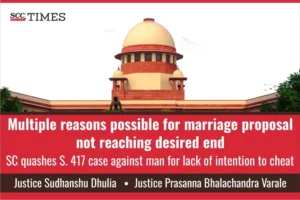Supreme Court: In a criminal appeal against Kerala High Court’s order whereby, the appellant’s petition under Section 482 of the Code of Criminal Procedure, 1973 (CrPC) was partly allowed and criminal proceedings for offence under Section 417 was refused to be quashed, the Division Bench of Sudhanshu Dhulia and Prasanna Bhalachandra Varale, JJ. allowed the appeal and set aside the impugned order.
Background
In the matter at hand, the respondent-2 lodged the First Information Report (‘FIR’) for offences under Section 406, 420, 417 read with Section 34 of the Penal Code, 1860 (‘IPC’) against six persons including the present appellant. The family of the respondent-2 was searching for a suitable bridegroom for her, and the present appellant was considered for the same. The appellant and the respondent-2 were thereafter talking to each other on phone and her father had also given Rs.75,000/- in advance for the marriage hall, but the marriage never took place. The respondent-2 found out from a newspaper report that the appellant had married someone else. Hence, the FIR was lodged.
Thereafter, a petition was filed under Section 482 of the CrPC for quashing the proceedings against all the six persons who were named in the FIR. The Single Judge of the High Court concluded that no offences under Section 406 or under Section 420 was made out against any of the accused persons, including the present appellant. However, the Court said that prima facie, the offence under Section 417 of the IPC was made out as the present appellant intended to deceive the informant by receiving the money for clothes and marriage hall booking.
Decision
The Court perused Section 415 of the IPC, which defines cheating and said that the offence of cheating is in two parts, the first being where a person fraudulently or dishonestly deceives another in inducing that person to deliver any property to any person etc., and the second part would be made out if somebody is deceived to do an act which causes damage or harm to that person ‘in body, mind, or reputation or property’. The Court reiterated that to make out an offence under cheating the intention to cheat or deceive should be right there from the beginning. Further, the Court referred to Hridaya Ranjan Prasad Verma v. State of Bihar, (2000) 4 SCC 168 wherein, it was held that to hold a person guilty of cheating it is necessary to show that there was fraudulent or dishonest intention at the time of making the promise.
In the present case, the Court said that no such intention to cheat from the beginning could be made out from the complaint of respondent-2. The Court stated that there can be multiple reasons for initiating a marriage proposal and then the proposal not reaching the desired end. The Court also added that in such cases the prosecution must have reliable and trustworthy evidence, however, in the present case, no such evidence was available and therefore no offence under Section 417 of the IPC was made out. Consequently, the Court allowed the appeal and set aside the order of the High Court to the extent it refrained from quashing the proceedings under Section 417 of the IPC against the present appellant.
[Raju Krishna Shedbalkar v. State of Karnataka, 2024 SCC OnLine SC 200, Order dated: 02-02-2024]

